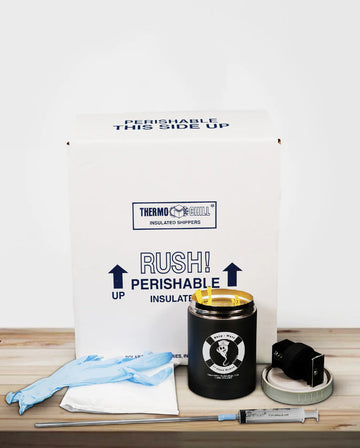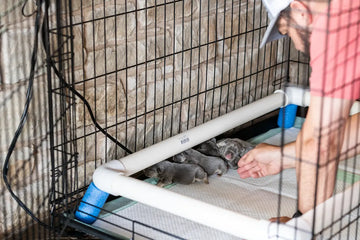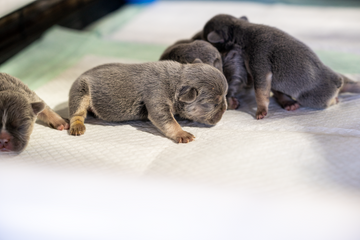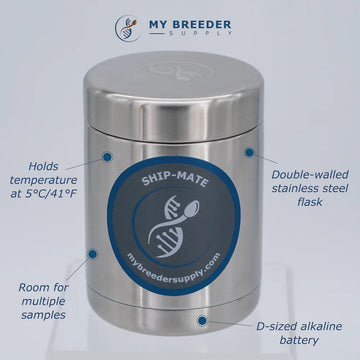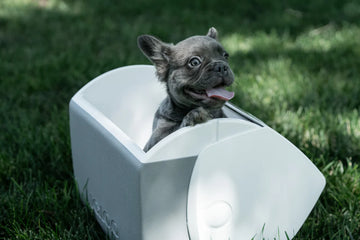
Bringing a new litter of puppies into the world is a heartwarming experience, but it comes with a significant responsibility. Newborn puppies are incredibly fragile, and ensuring their safety and well-being is paramount.
By following these steps diligently, you can provide the best possible start in life for these adorable little ones.
Understanding the Need for Puppy Incubators
Why Do Newborn Puppies Need Incubators?
Newborn puppies are exceptionally vulnerable during their first few weeks of life. They are born with underdeveloped immune systems, have limited ability to regulate their body temperature, and are highly susceptible to infections.
This is why puppy incubators play a crucial role in their early care.
The Benefits of Using a Puppy Incubator
Maintaining Optimal Temperature:
Newborn puppies cannot regulate their body temperature effectively. An incubator provides a stable and warm environment, typically set at around 85-90°F (29-32°C), ensuring the puppies stay comfortably warm.
Protection from Infections:
Controlled environments minimize the risk of bacterial infections that could be life-threatening to fragile puppies.
Assisting with Premature Puppies:
Premature puppies often struggle with their vital functions. Incubators are a lifeline for these little ones, offering them the warmth and protection they need to survive and thrive.
Monitoring and Observation:
Incubators come with clear viewing windows, allowing breeders and veterinarians to closely monitor the puppies' health and development. This constant vigilance ensures early intervention if any issues arise.
Setting Up a Safe Puppy Incubator
Choosing the Right Incubator
Selecting the right incubator is the foundational step in providing a safe environment for newborn puppies. Ensure it has the following features:
- Temperature Control: Look for an incubator with precise temperature control settings and a reliable thermostat.
- Humidity Control: A good incubator should allow you to maintain the appropriate humidity levels (typically 55-65%) essential for puppy health.
- Ventilation: Check for adequate ventilation to ensure fresh air circulation without drafts.
- Easy Cleaning: Opt for an incubator with removable parts for easy cleaning and maintenance.
Temperature Control
Maintain Constant Temperature:
Set the incubator's temperature within the recommended range and monitor it closely. Temperature fluctuations can be detrimental to the puppies' health.
Use a Thermometer:
Always place a thermometer inside the incubator to double-check and ensure the temperature remains consistent.
Humidity Levels
Maintain Proper Humidity:
Adequate humidity is crucial for preventing dehydration, especially in tiny puppies. Use a hygrometer to monitor and adjust humidity levels as needed.
Proper Ventilation
Adequate Airflow:
Ensure the incubator has sufficient ventilation to prevent the buildup of carbon dioxide and maintain oxygen levels. However, avoid direct drafts on the puppies.
Hygiene and Cleaning
Regular Cleaning:
Clean the incubator daily to prevent the growth of harmful bacteria. Remove any soiled bedding promptly.
Use Pet-Safe Disinfectants:
When cleaning, opt for disinfectants that are safe for puppies. Consult your veterinarian for recommendations if unsure.
Monitoring the Puppies
Regular Check-Ins:
Schedule regular check-ins to observe the puppies' behavior, breathing, and overall condition. Look for signs of distress or illness.
Record Vital Signs:
Keep a detailed record of each puppy's weight, temperature, and feeding times. This record will help you track their progress and identify any concerns.
Handling the Puppies
Handle with Care:
While it's important to monitor the puppies, limit unnecessary handling, as it can cause stress. Only handle them when essential, such as during feeding or health checks.
Practice Good Hygiene:
Always wash your hands thoroughly with a pet-safe soap before and after handling the puppies to prevent the spread of germs.
Feeding and Nutrition
Consult a Veterinarian:
Seek advice from a veterinarian to determine the best feeding schedule and formula for your puppies. Each litter may have unique needs.
Regular Feeding:
Stick to a consistent feeding schedule, as puppies require frequent, small meals to thrive.
Feeding Techniques
Bottle Feeding:
Use a high-quality puppy-specific bottle and nipple to ensure proper feeding. Follow the recommended guidelines for the formula's temperature and quantity.
Burping Puppies:
After each feeding, gently pat the puppies' backs to help them expel any trapped air, preventing discomfort and gas buildup.
Caring for newborn puppies in a puppy incubator is a crucial responsibility that demands attention to detail and dedication.
By implementing these safety measures, breeders and pet owners can create a nurturing and secure environment for these delicate beings, promoting their healthy growth and development.
FAQs on Puppy Incubator Safety Measures
How long should newborn puppies stay in an incubator?
The duration that puppies should remain in an incubator varies depending on their individual needs. Typically, puppies should stay in the incubator for at least the first two weeks of life or until they can maintain their body temperature independently. Premature puppies may require a longer stay.
Can I use a heating pad as a substitute for a puppy incubator?
While heating pads can be used in emergencies, it's essential to understand that they may not provide the same level of temperature control and safety as a dedicated puppy incubator. Incubators are specifically designed to create a controlled and safe environment for newborn puppies.
What should I do if a puppy becomes sick while in the incubator?
If a puppy shows signs of illness, such as lethargy, difficulty breathing, or refusal to eat, it's crucial to contact a veterinarian immediately. Early intervention is essential for addressing health issues and ensuring the best chance of recovery.
Is it safe to create a homemade incubator for puppies?
Homemade incubators can be risky, as they may lack the necessary temperature and humidity control required for the well-being of newborn puppies. It's recommended to use a professional-grade incubator to provide a safe and controlled environment.
When can I introduce puppies to their mother outside of the incubator?
The timing for reintroducing puppies to their mother can vary, but it typically occurs when they can maintain their body temperature, demonstrate healthy development, and show interest in nursing. Consult with a veterinarian or experienced breeder for guidance on the appropriate time to reunite the puppies with their mother.

